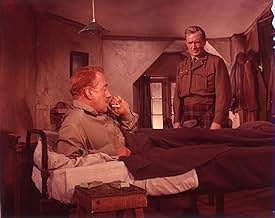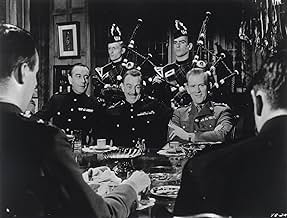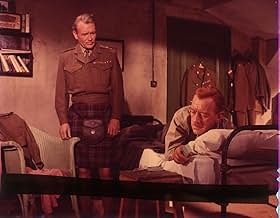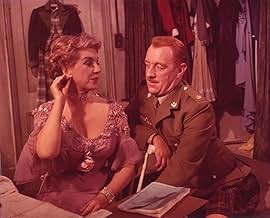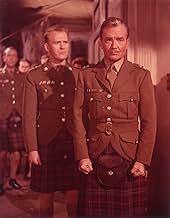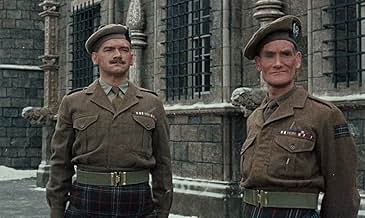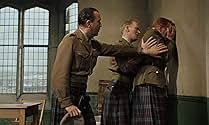Después de la Segunda Guerra Mundial, el oficial al mando en funciones de un regimiento de las Highlands, es sustituido por un oficial al mando educado en Oxford en tiempos de paz, lo que pr... Leer todoDespués de la Segunda Guerra Mundial, el oficial al mando en funciones de un regimiento de las Highlands, es sustituido por un oficial al mando educado en Oxford en tiempos de paz, lo que provoca un dramático conflicto entre ambos.Después de la Segunda Guerra Mundial, el oficial al mando en funciones de un regimiento de las Highlands, es sustituido por un oficial al mando educado en Oxford en tiempos de paz, lo que provoca un dramático conflicto entre ambos.
- Nominado para 1 premio Óscar
- 2 premios y 7 nominaciones en total
Reseñas destacadas
Sadly, for him, his informal barracks is going to be reformed under the auspices of the public school via Sandhurst graduate Lt. Col. Basil Barrow (John Mills) who believes in doing all things by-the-book. This sets the scene for a post WW2 power battle under a grey Scottish winter sky.
When writing a review of any excellent film - such as this - you are frightened you are going to put people off by its limits. However this is a classic example of less really being more. The claustrophobic atmosphere and the sense that armies without wars are prone to be heavy with politics. Not unlike like prisons: To many people in the same space with too much time on their hands. They drive men mad and extend the worst in the human character.
Guinness and Mills are fantastic actors. Oscar winners both and more. They could read the phone book and captivate an audience. For the record they had both seen war service, although Mills baby face and short stature had made him the butt of many jokes (many he was happy to re-tell). Did this help form his character? The guy who was laughed at and therefore worked even harder to enforce discipline or gain respect. This is, naturally, speculation.
I have no the knowledge of author (of book and film) but just by watching you know he has seen it for real. The little details that only the insider would know. The story would just as well be served as a theatre piece and it employs some its stock devices. The accidental narrator being the more obvious. Maybe this was to save money, but it would not have helped the picture to see - say - the incident that Mills had to endure from the Japanese.
Eyewitness testimony from the filming says that Guinness thought he would look silly in a kilt and used fake tanner on his pale legs. He is not the biggest of men and has to stick out his chest and stand on tiptoe to be imposing, but you do believe him. What an actor he was. An actor's actor. Like Peter Sellars, totally bland out of character (and not always very nice as he writes in his various autobiographies) but always mesmeric on screen. Mills - on the other hand - could never work as a bad guy. The perfect uncle figure who you would want to confide in.
(I am maybe giving the support cast short-shrift - but most British films of the time had quality character actors. No exception here. Amazing to see Susannah York in her first role.)
Alfred Hitchcock himself said Tunes of Glory was his own personal favourite film. It is not quite mine, but a great demonstration of how brilliant film can be when top class actors get their teeth in to a wonderful script. The end is pure Shakespeare. Don't watch it once, watch it twice...
I am not as enamored of "Tunes of Glory" as I am of, say, "Bridge on the River Kwai," but it is without question a powerful movie. The conflict between Sinclair and Barrow is palpable; I think, in particular, of Mill's violently trembling rage during the dancing scene, and Guinness's dismissive ridicule of Barrow's deepest confidences ("toy soldiers!") during his attempt to con him into clemency. Sinclair's grief-stricken collapse at the end is truly an unforgettable scene and a tribute to Guinness's power.
The book is a slim volume, but is fast moving and full of character. Set in provincial Scotland, the flavour of the film is as strong as the novel (by James Kennaway who also wrote the screenplay) but the characterisation by the actors builds on and then surpasses the script. I note that neither of the actors is Scottish and this amazes me. Maybe I should seek advice from a Scot on this matter.
We never leave the barracks or the quiet army town and so learn only by rumour how Jock Sinclair, on some blasted field at the centre of El Alamein saved his regiment and turned the battle. Half the officers and men were dead, the cause lost, yet his spirit and the force of his will brought him a battlefield promotion to acting colonel. The Regiment is what he lives for.
Several years later, in peacetime, the army catches up with its paperwork and sends a proper officer to take back the reins. Basil Barrow arrives unexpectedly from a desk job and Sandhurst. His assignment is to organise and civilise the men, long gone wild under Jock's supervision. John Mills plays the rather impotent lonely Barrow as an accentless and educated man. There are "dark rumours" amongst the men that he may be English.
The clash between the two men commences immediately on their meeting and ends in scenes of mourning and redemption.
This is an actors film. There are few effects and much of the action is centred on one or the other of Guinness or Mills. Sinclair is a piper, this gives him an almost spiritual air and his feel for music (the Tunes of Glory) is the first area of contention between the two Colonels. When Jock leads his men in a wild and unruly reel with arms flailing and much shouting and yipping at a society ball the ensuing fit from the uptight and conservative Mills is wonderful. He trembles and shakes and we do likewise.
The film builds and builds to a finale full of Tunes of Glory and we come to an understanding about both men, as they come to understand each other.
I've heard of this movie for a long time, and knew that it was well-liked (Guinness considered it one of his best performances), but it wasn't what I was expecting. It's a psychological study of these two men, and, with the Barrow character, an early examination of PTSD before it was called that (he was a P. O. W. In a Japanese camp, and was tortured). The accents can be a bit much, and if you don't like bagpipes, this is definitely not the movie for you, but I thought the acting was terrific, and the slow-burn drama builds to a shattering conclusion.
I would take issue with the reviewer who said that the Mills character would never have been given command. Clearly he had been highly educated, had a long and distinguished career in a headquarters job following a traumatic time as a POW of the Japanese. He would have at least earned some kind of moral right at the end of his career and in peacetime to be given the job that he believed he really wanted and might have thought to have been among friends. He would most likely have been highly respected owed favours and been able to pull strings. Had Jock Sinclair (Guinness) - unashamedly uneducated, rough and proud to have been educated in Barlinnie jail, Glasgow and deeply popular with his men not been the officer he replaced, most likely Colonel Barrow would have made a success of it. The whole entirely believable tragedy came about through the grotesque mischance that with these so different characters, one had to wrest command - and respect of the men - from the other. Colonel Barrow's fragility was only exposed when he tried to impose his English "civilising" ways on the one person whose whole being rejected them. Bad enough if it had been simply about class, here it was a battle for the Scottish soul. These deeper levels of conflict deriving from earlier historical intra-Scottish battles was suggested by one reviewer. The film tells a story which perhaps could have been set in almost any country with a strong military tradition - France. Germany, Japan etc rather like its near name-sake "Paths of Glory" by Stanley Kubrick set in WW1 France. Here though the central conflict presumably had very deep roots in Scottish ethnic and tribal history of clan wars, of Highlanders vs Lowlanders even of those supposed English-loving "traitors" who "sold" Scotland to "a parcel of rogues" (The English) in 1707. It may well be that for Sinclair, the entirely Anglicised Colonel Barrow (gin-drinking, aloof, distant and without a hint of a Scottish accent) represented exactly that kind of treacherous pseudo-Scot.
One reviewer describes it as "pure John Ford" leaving it unclear if he is suggesting that it was similar or derivative. With art in general, its lower and by definition least original forms ape others. This film does not ape any other - as already said the intensity of the conflict derives not just from class but from old old historical grievances between two intimately close nations. In "Old" Europe grievances and rivalries ran long and deep.
Just a rather sad footnote. One reviewer mentioned similarities to earlier John Ford/John Wayne movies. The entire John Wayne archive is to be seen on a continuously circulating basis on two of Britain's five national television channels State broadcaster the BBC and so-called public service broadcaster Channel 4. Yet in contrast Tunes of Glory has rarely been shown. It reappeared 2 years ago but in a poor quality print on a remote satellite channel which plays mainly public domain material. Many of Britain's fine vigorous quality films of the 1960s have never been shown at all on British television until a few months ago when again a very minor satellite channel started showing them: Otley, The Hireling, The Reckoning and others. I did not see them originally and it was revelation seeing the bold acting and directing talent which existed then and how sad is the current decline into the Lock Stock etc formulaic gangster stuff. Very curious indeed that great British films are not shown on the supposed British public service channels and it is left to small satellite channels Movies4Men and Simply Movies to show them. Very curious indeed. Public service broadcasting not in the service of the public.
¿Sabías que...?
- CuriosidadesSir Alec Guinness was offered the role of Lieutenant Colonel Barrow, but asked for the role of Major Sinclair instead. He then suggested Sir John Mills for the other role.
- PifiasPipe Major MacLean is never shown with a set of bagpipes. In particular, he is a mere observer at band practice. A pipe major is not only the leader of the band but also its chief instructor, and it is unthinkable that he would not play an active role in all practices.
- Citas
Major Jock Sinclair, D.S.O., M.M.: We're on a first name basis in this regiment. Your first name is Derek. My first name is Major.
- ConexionesFeatured in Film Extra: Alec Guiness (1973)
Selecciones populares
- How long is Tunes of Glory?Con tecnología de Alexa
Detalles
- Fecha de lanzamiento
- País de origen
- Idioma
- Títulos en diferentes países
- Tunes of Glory
- Localizaciones del rodaje
- Stirling Castle, Stirling, Escocia, Reino Unido(establishing shots)
- Empresas productoras
- Ver más compañías en los créditos en IMDbPro
- Duración1 hora 47 minutos
- Color
- Relación de aspecto
- 1.66 : 1
Contribuir a esta página



